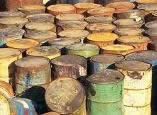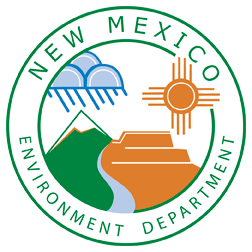Waste is something all of us create, in varying amounts, throughout our daily lives. It is often unavoidable, but can be a challenge to deal with. NMED has many programs that work with businesses, organizations, and communities to reduce and manage our waste here in New Mexico.
Waste can be addressed in many different ways through proper disposal, recycling, storage, or reducing the amount created in the first place (source reduction).
The types of waste we deal with in New Mexico include Solid Waste, Hazardous Waste, Liquid Waste, Wastewater, and other types such as radioactive waste.
Proper management of these wastes will help protect our air, land, ground water, surface waters, and public health.
NMED is responsible for monitoring and controlling the generation, storage, transportation, and disposal of wastes in New Mexico.
Waste is something all of us create, in varying amounts, throughout our daily lives. It is often unavoidable, but can be a challenge to deal with. NMED has many programs that work with businesses, organizations, and communities to reduce and manage our waste here in New Mexico.
Waste can be addressed in many different ways through proper disposal, recycling, storage, or reducing the amount created in the first place (source reduction).
The types of waste we deal with in New Mexico include Solid Waste, Hazardous Waste, Liquid Waste, Wastewater, and other types such as radioactive waste.
Proper management of these wastes will help protect our air, land, ground water, surface waters, and public health.
NMED is responsible for monitoring and controlling the generation, storage, transportation, and disposal of wastes in New Mexico.



(For illegal dumping, spills, or other
waste management concerns)
Waste Permits & Registrations INFO
Waste Cleanups &
Remediation of Contaminated Areas
NMED Waste Management Programs:
Ground Water Pollution Prevention
(Ground Water Quality Bureau)
Point Source Discharge Regulation
(Surface Water Quality Bureau)
Wastewater Operator Certification Program
(Surface Water Quality Bureau)
Construction Programs Bureau
for water, wastewater, & solid waste infrastructure)
Solid Waste
Solid Waste (non-hazardous waste) can be broadly defined as any material no longer used for its intended purpose. It is what most of us think of as “trash” or “garbage”.
More specifically, the EPA defines solid waste as any garbage or refuse, sludge from a wastewater treatment plant, water supply treatment plant, or air pollution control facility and other discarded material, including solid, liquid, semi-solid, or contained gaseous material resulting from industrial, commercial, mining, and agricultural operations, and from community activities. Nearly everything we do leaves behind some kind of waste.
Two common types of Solid Waste:
- Municipal Solid Waste – “everyday” waste from homes, offices, and schools. More @ EPA.gov
- Industrial Waste – variety of materials resulting from the production of goods & products (ex: construction & demolition, special waste, medical waste, CO2 streams). More @ EPA.gov
NMEDmanages and monitors activities regarding solid waste in New Mexico. We do this through permits, enforcement of regulations, and outreach.
Permits, Registrations, & Enforcement actions apply to:
| landfills | solid waste haulers |
| transfer stations | air curtain incinerators |
| transformation facilities | infection waste treatment processes |
We also approve such activities as: closure plans, ground water and methane monitoring plans reports, and oversees landfill liner and cap, and well installations.
- NMED operates under multiple statutes, rules, memorials, and executive orders for solid waste listed HERE.
- We have jurisdiction in Mew Mexico to regulate the management of solid waste at permitted and registered solid waste facilities but NOT on public lands or most private lands
- NM has been granted Primacy to implement federal (EPA) solid waste regulations within the state.
- Our managing program is the Solid Waste Bureau.
Learn more at the SOLID WASTE page…
Hazardous Waste
Hazardous Waste is waste that is dangerous or potentially harmful to our health or the environment.
Hazardous wastes can be liquids, solids, gases, or sludges. They can be discarded commercial products, like cleaning fluids or pesticides, or the by-products of manufacturing processes.
Types of Hazardous Waste:
Listed waste – some specific wastes determined to be hazardous by the EPA and published in lists as such. More @ EPA.gov
Characteristic waste – wastes not specifically listed but exhibits one of 4 hazardous characteristics (Ignitability, Corrosivity, Reactivity, Toxicity). More @ EPA.gov
Universal waste – specific, federally designated wastes falling under a streamlined system for management (includes: batteries, pesticides, Mercury-containing equipment, light bulbs).
More @ EPA.gov
Who generates hazardous waste? Many types of businesses and institutions. If your business or institution generates hazardous waste, you must comply with certain requirements, depending on the quantity of hazardous waste you generate during any given month.
Hazardous waste generator categories:
1) Large Quantity Generators (LQGs)
2) Small Quantity Generators (SQGs)
3) Conditionally Exempt Small Quantity Generators (CESQGs)
NMED operates under the New Mexico Hazardous Waste Act [HWA; Chapter 74, Article 4 NMSA 1978] and regulations promulgated under the Act.
*NMED does NOT regulate household hazardous waste.
Our managing program is the Hazardous Waste Bureau.
Learn more at the HAZARDOUS WASTE page…
Storage tanks
Storage tanks are used to store petroleum or certain other hazardous liquids. Leaking tanks can pose a serious environmental threat if the stored contents seep into the soil and contaminates ground water, the source of much of New Mexico’s drinking water.
NMED regulates:
- Underground Storage Tanks (UST) larger than 110 gallons.
- Above ground storage tanks larger than 1320 gallons but less than 55,000 gallons.
The regulations apply to owners and operators of storage tanks containing petroleum products and other regulated substances.
NMED has Primacy from EPA, which recognizes that the New Mexico regulations are at least as protective as the federal rules and regulations.
Our activities include:
- Maintaining a registry of all storage tanks and storage tank facilities in the State.
- Inspecting every tank at every facility at least once every three years to ensure compliance with all rules and regulations.
- Collecting annual tank fees and penalties associated with notices of violations issued to tank owners an operators
- Overseeing corrective action conducted at facilities that have released regulated substances into the environment.
- Managing a Corrective Action Fund to reimburse tank owner and operators the costs of conducting corrective actions at their facilities, if they are in substantial operational compliance with the Rules and regulations.
More information:
NMED Petroleum Storage Tank Bureau
Wastewater
Wastewater management encompasses a broad range of efforts that promote effective and responsible water use, treatment, and disposal and encourage the protection and restoration of our nation’s watersheds.
Within NMED there are multiple programs working with businesses, communities, individuals, and the EPA to manage different types of wastewater. NMED regulates municipal and industrial operations discharging water to surface or groundwater.
Discharges to Ground Water
NMED monitors and issues Ground Water Discharge Permits to address a wide variety of discharges including:
| Commercial land farms (contaminated soil treatment) | Ground water remediation systems |
| Commercial laundries (not served by sanitary sewers) | Industrial discharges |
| Dairies | Large capacity septic tank leachfields |
| Domestic wastewater facilities | Power generating plants |
| Food processing plants | Reclaimed wastewater reuse |
See the Ground Water Quality Bureau’s Pollution Prevention Section for more information.
Discharges to Surface Water
NMED monitors and inspects all point source discharges in the state to assure compliance and compatibility with applicable state and federal laws. Our activities include:
- Assisting the EPA in implementing its National Pollutant Discharge Elimination System (NPDES) permitting program.
- Conducting and maintaining a comprehensive monitoring program for the regulated community of industrial and municipal effluent dischargers.
- Reviewing federal NPDES permits for municipal wastewater treatment plants, electrical generating stations, fish hatcheries, mines, etc.
Wastewater also includes stormwater. NMED is responsible for the protection of surface water quality through the State by regulating point source discharges of pollutants to surface watercourses.
See the Surface Water Quality Bureau for more information on Point Source Discharges and Stormwater.
Public Water & Wastewater Infrastructure
NMED works with communities to develop, track, and inspect the infrastructure needed to manage wastewater. We:
- Administer Water and Wastewater Operators at all public water and wastewater utilities in New Mexico through the Operator Certification Program
- Assist communities to plan, fund, implement, and maintain wastewater system projects through the Construction Programs Bureau.
Liquid Waste
Nearly 1 in 4 households in the US depends on an individual septic system (or “on site system”) to treat their wastewater. If managed properly, these systems protect public health and valuable water resources. More @ EPA.gov
Through the Liquid Waste Program, NMED issues permits or registrations for septic systems.
We also provide:
- technical assistance
- education
- information
- Free domestic well testing
More information:
The Resource Conservation and Recovery Act (RCRA)
The Resource Conservation and Recovery Act (RCRA), an amendment to the Solid Waste Disposal Act, was enacted in 1976 to address the huge volumes of municipal and industrial solid waste generated nationwide.
The goals set by RCRA are:
- To protect human health and the environment from the potential hazards of waste disposal.
- To conserve energy and natural resources.
- To reduce the amount of waste generated.
- To ensure that wastes are managed in an environmentally sound manner.
RCRA regulates Solid Waste, Hazardous Waste, and Underground Storage Tanks.
In Brief:
RCRA Subtitle C establishes a federal program to manage hazardous wastes from cradle to grave. The objective of the Subtitle C program is to ensure that hazardous waste is handled in a manner that protects human health and the environment. To this end, there are Subtitle C regulations for the generation, transportation, and treatment, storage, or disposal of hazardous wastes.
RCRA Subtitle D focuses on state and local governments as the primary planning, regulating, and implementing entities for the management of non-hazardous solid waste.
RCRA Subtitle I regulations cover Underground Storage Tanks (UST)storing petroleum or listed hazardous substances, and define the types of tanks permitted. EPA established a tank notification system to keep track of status. UST regulatory programs are principally administered by state environment agencies.
For more information about RCRA visit EPA’s website for the
RCRA Orientation Manual
Recycling
Recycling is the process of transforming waste materials into usable resources. It is preferable to treatment and disposal because it helps conserve energy and reduce waste.
Waste diversion refers to the act of keeping waste out of the landfill through processes such as reuse, repair, and recycling.
Although the state has no mandated waste diversion goal, pollution prevention and recycling are supported and encouraged through NMED public education and outreach activities.
NMED also works closely with the New Mexico Recycling Coalition to plan and implement recycling initiatives in the state. The NMRC is a valuable source of information for all types of recycling in New Mexico.
for more information on recycling, waste diversion, and waste reduction:
New Mexico Recycling Coalition
Financial Assistance for Waste Management:
Solid Waste:
- Recycling and Illegal Dumping (RAID) Grants
- for tire management projects to include: abatement and clean-up of illegal tire dumpsites, construction projects using tire bales, recycling of scrap tires, and purchase of recycled tire products.
- for illegal dumpsite abatement, recycling equipment, and education projects.
- Solid Waste Facility Grant – for municipalities, solid waste authorities, educational institutions and cooperative associations for: closure of a landfill, groundwater and methane monitoring, and transfer station improvements, or other solid waste facility improvements.
Petroleum Storage Tanks:
- Corrective Action Fund – provides funding for cleanup related to petroleum storage tank releases. Includes initial abatement, minimum site assessment, soil and water investigation, ongoing monitoring, remediation including operation and maintenance costs, and post remediation monitoring.
Wastewater:
- Clean Water State Revolving Loan Fund – a source of low-cost financing for a wide range of wastewater or storm water drainage projects that protect surface and ground water. Funds may also be used for projects that control nonpoint source water pollution, such as a solid waste and septic tank installations.
- Rural Infrastructure – financial assistance to eligible local authorities for the construction or modification of water supply, wastewater, and solid waste facilities.
- Special Appropriations (Construction Programs) – state grants for special projects issued annually when authorized by the New Mexico Legislature during the legislative session and approved by the Governor.

